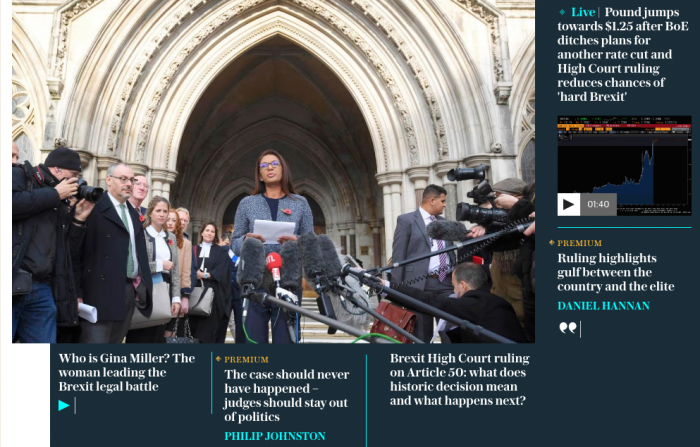
It swapped out the meter for a premium model on Thursday, tucking content like opinion columns, features, analysis, and exclusive interviews behind a hard paywall. A digital subscription starts at £2 per week for digital access to premium stories (£6 per week includes access to smartphone and tablet editions), and includes other perks like exclusive events, a year of digital access to The Washington Post, and an Amazon Echo Dot for the first 1,200 annual premium subscribers. A subscription also unlocks comments, which were suspended earlier this year.
The change will help The Telegraph scale and grow a loyal, paying readership, according to the Telegraph Media Group’s chief information officer Chris Taylor.
“The real driver of the change is around the change in The Telegraph’s business model as a whole,” Taylor told me. Before joining the Telegraph, Taylor worked at News UK, where the Times of London brand has operated with a famously hard paywall and The Sun dropped its altogether. “We were looking to have subscriptions, but also scale a native advertising business, e-commerce, and particularly content around travel. As the business model started to diversify, we founded the metered strategy for managing digital subscriptions no longer easily gave us the ability to allow those businesses to mutually reinforce and coexist.”The metered model, which had most recently allowed eight free stories per week, didn’t really let The Telegraph differentiate between readers who were reading a story as a subscriber and readers who were reading it for free. The meter also didn’t run on mobile web or through third-party platforms (like social media and Google AMP versions of stories).
“Now, Telegraph Premium is a clear and distinct subscription part of our proposition, and the free layer is an equally important but quite clear and distinct part of our proposition as well,” Taylor said. “It allows us to develop and enhance and give oxygen to the subscription part of the business, without having contradiction to the scale part of our business, so we can also grow our sponsored content, e-commerce, and global reach.”Previous paying subscribers from the metered model era will be moved over to become premium subscribers (Taylor declined to say how many paying subscribers The Telegraph has). The Telegraph is starting out with roughly 15 percent of its content behind the hard paywall, informed by analytics on what types of stories tend to encourage readers to subscribe.
But “we’re open-minded about it,” Taylor said, and there’s flexibility built in on the backend so editors and teams can choose which stories are designated premium upon publication.
Other bundled perks, like a free trial of Google Play Music and the Amazon Echo Dot, were no-brainers: “We’re quite close to Amazon and Google.” And the Washington Post subscription, Taylor pointed out, gives U.K. readers, who are watching the 2016 campaign as closely as many Americans, access to more in-depth coverage of the U.S. presidential election and its aftermath.